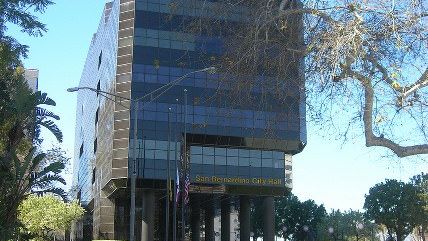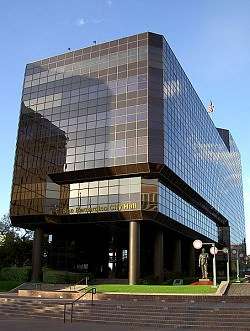Bankrupt San Bernardino Attempts to Address Inability to Actually Negotiate Public Safety Wages


San Bernardino, California, announced it was bankrupt in 2012, and in 2013 a judge agreed. San Bernardino suffers many of the same problems ailing municipalities across the country face—huge pension obligations that are either unsustainable or that the city simply ignored in favor of cronyist economic development projects (or oftentimes both).
San Bernardino, though, also has additional twist that is hamstringing any effort to actually balance its budget: The city has no real control over the wages for its public safety employees. The city's charter requires that the city set its wages for its police and fire employees based on the average wages for public safety employees in nearby cities of similar sizes. The big problem here is that San Bernardino is the poorest of these cities. It's considered one of the poorest metropolitan areas in the country, next to Detroit. As a result, public safety employee wages, usually the biggest expense in any city's budget, were completely out of their hands. Even during bankruptcy proceedings, the city council was handing out raises to the police, blaming the city charter's rule.
Following recent elections, which have resulted in almost a complete turnover in city leadership, the new city council voted unanimously this week to put several changes to the city's charter on the ballot for public vote. Among the changes will be the removal of this charter rule, known as Section 186. Instead, the city will set wages through collective bargaining, the way many other cities do. This obviously doesn't necessarily make everything better. Many cities have been more than willing to capitulate to unreasonable employee union demands anyway. But it at least puts the city in a position to actually say no. Ryan Hagen, covering city government for The Sun in San Bernardino, reported that the president of the local police union is looking for ways to kill the effort to replace the rule.
I wrote about the particulars of San Bernardino's troubles in the November 2013 issue of Reason. Last week, Kennedy and Reason contributor Steven Greenhut looked at the city's woes during an episode of The Independents. Enjoy below:
Editor's Note: As of February 29, 2024, commenting privileges on reason.com posts are limited to Reason Plus subscribers. Past commenters are grandfathered in for a temporary period. Subscribe here to preserve your ability to comment. Your Reason Plus subscription also gives you an ad-free version of reason.com, along with full access to the digital edition and archives of Reason magazine. We request that comments be civil and on-topic. We do not moderate or assume any responsibility for comments, which are owned by the readers who post them. Comments do not represent the views of reason.com or Reason Foundation. We reserve the right to delete any comment and ban commenters for any reason at any time. Comments may only be edited within 5 minutes of posting. Report abuses.
Please to post comments


"I left my budget in San Bernardino"
Is there a special connection to Switzerland?
I was (failing apparently) to get people with the ear worm ... I Left My Wallet in El Segundo.
I got the reference, and will be hating you for the rest of the day for it.
MISSION ACCOMPLISHED!!!!
I've never actually heard the song, and I regularly drink in El Segundo (but have yet to leave my wallet there).
See any 4 foot tall dudes with sombreros?
Linked to the correct time so you can answer Swiss' question.
What about that clause made it seem like a good idea when it was implemented?
..."the president of the local police union is looking for ways to kill the effort to replace the rule."
You'd think human parasites would learn not to kill the host.
Also illuminating - the top 7 employers in the city are government entities in one form or another:
http://en.wikipedia.org/wiki/S....._employers
Just me, or does that building look like Deep Thought from The Hitchhiker's Guide to the Galaxy?
"I went from San Berdoo to Kalamazoo, just to get away from you."
Because the city council isn't the management with which the union is negotiating. I AM. The city council has zero interest whatsoever in holding down wages to any reasonable level. Yet, I have zero power in those wage negotiations, except to vote in a new person which also has zero interest in maintaining the wages to a reasonable level.
Why? Because the Union members vote too. And often, the person running for city council needs the union endorsement to win.
Sorry, you know not of what you speak.
City Council members don't go to the trouble of running for office so they can be tossed out as soon as the City has to file bankruptcy.
High wages paid to city employees don't get too many votes, money spent on such things as "homeless" programs, that's where the votes are.
The biggest driver of pay levels, when bargaining in local governments, is the fact that the authorities don't want to be forced into the dreaded "disclosure", whereby they must let the cat out of the bag as to what else they spend money on, and it ain't usually on the up-and-up.
Seeing if my comments are still not showing up.
The problem isn't the average wage they're stuck paying, it's the number of people they're paying.